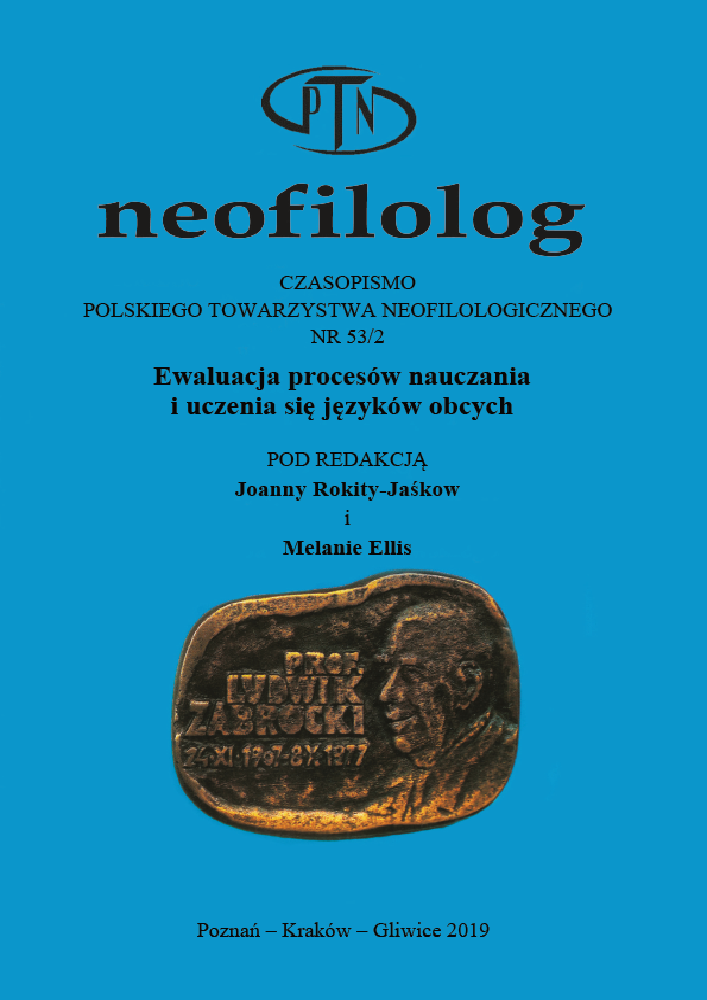Abstract
Writing is a complex skill since it requires the integration of various competences, which is a phenomenon extensively examined and discussed by researchers. However, the relation among these competences and their mutual influence, particularly at lower language proficiency levels (A1-A2/A2+), are analyzed more seldom. This issue constitutes the primary interest of our research. Carried out in the Institute of Romance Studies at Warsaw University, it focused on the following questions: how to adjust the evaluation method taking into account the above relation in order to facilitate the understanding of the complexity of the process of writing and to increase its effectiveness. The main study was preceded by a survey, conducted among all the students of the first year, who were beginners, concerning their perception of the difficulties of writing as well as their needs and expectations towards the writing class.
Literaturhinweise
Brown D. (2001), Teaching by principles: An interactive approach to language pedagogy. USA: Longman Pearson Education Company.
Barkaoui K. (2007), Teaching Writing to Second Language Learners: Insight from Theory and Research (w) „TESL Reporter”, nr 40, str. 35-48.
Chandler J. (2003), The efficacy of various kinds of error feedback for improvement in the accuracy and fluency of L2 student writing (w) „Journal of Second Language Writing”, nr 12, str. 267-296.
De Ketele J.-M. (2010), Ne pas se tromper d'évaluation (w) „Revue française de linguistique appliquée”, vol. XV, nr 1, str. 25-37. Online: https://www.cairn.info/revue-francaise-de-linguistique-appliquee-2010-1-page-25.htm [DW 02.08.2019].
De Ketele J.-M. (2013), L'évaluation de la production écrite (w) „Revue française de linguistique appliquée”, vol. XVIII, nr 1, str. 59-74. Online: ttps://www.cairn.info/revue-francaise-de-linguistique-appliquee-2013-1-page-59.htm [DW 02.08.2019].
Europejski system opisu kształcenia językowego: uczenie się, nauczanie, ocenianie. (2003). Warszawa: Wydawnictwo Centralnego Ośrodka Doskonalenia Nauczycieli.
Ferris D. R. (1999), The case for grammar correction in L2 writing classes: A response to Truscott (1996) (w) „Journal of Second Language Writing”, nr 8, str. 1-11.
Ferris D. R. (2004), The „Grammar Correction” Debate in L2 Writing: Where are we, and where do we go from here? (and what do we do in the meantime…?) (w) „Journal of Second Language Writing”, nr 13, str. 49-62.
Gérard F.-M. (2013), L'évaluation au service de la régulation des apprentissages: enjeux, nécessités et difficultés (w) „Revue française de linguistique appliquée”, vol. XVIII, nr 1, str. 75-92. Online: https://www.cairn.info/revue-francaise-de-linguistique-appliquee-2013-1-page-75.htm [DW02.08.2019].
Mashhadi F., Biria R. (2016), Error Is Not Terror: Error Correction in Second Language Writing (w) „Journal of Applied Linguistics and Language Research”, nr 3 (6), str. 199-212.Online: https://www.researchgate.net/publication/308874156_Error_Is_Not_Terror_Error_Correction_in_Second_Language_Writing [DW 02.08.2019].
Richards J.C., Renandya W. (2002),Methodology in Language Teaching: An Anthology of Current Practice. New York: Cambridge University Press.
Silva T., Matsuda P. K. (2002), Writing (w) Schmitt N. (red), An introduction to applied linguistics. Londyn: Arnold, str. 251-266.
Sowa M. (2015), Savoir-évaluer, czyli co i jak oceniać w języku obcym (w) „Języki Obce w Szkole”, nr 3. Online: http://jows.pl/artykuly/savoir-evaluer-czyli-co-i-jak-oceniac-wjezyku-obcym?page=show [DW 02.08.2019].
Truscott J. (1996), The case against grammar correction in L2 writing classes (w) „Language Learning”, nr 46 (2), str.327-369.
Vigner G. (2015), L’écrit et la langue : Quelles priorités ? Quelles articulations ? (w) „Études de linguistique appliquée, revue de didactologie des languescultures et de lexiculturologie”, nr 179, str. 269-275.
Lizenz
Copyright (c) 2019 Agnieszka Dryjańska

Dieses Werk steht unter der Lizenz Creative Commons Namensnennung - Keine Bearbeitungen 4.0 International.
Autoren:
Die Autoren der zur Veröffentlichung in der Zeitschrift Neofilolog angenommenen Texte sind verpflichtet, den Vertrag über die Erteilung einer kostenlosen Lizenz für die Werke mit der Verpflichtung zur Erteilung einer Sublizenz CC auszufüllen, zu unterzeichnen und an die Adresse der Redaktion zurückzusenden.
Gemäß Vertrag erteilen die Autoren auf die in der Zeitschrift Neofilolog veröffentlichten Texte der Adam-Mickiewicz-Universität in Poznań eine nicht exklusive und kostenlose Lizenz und erlauben die Verwendung der Sublizenz Creative Commons Attribution-NoDerivatives 4.0 International (CC BY-ND 4.0).
Die Autoren behalten das Recht zur weiteren freien Verfügung über das Werk.
Benutzer:
Interessierte Onlinebenutzer dürfen die seit 2017 veröffentlichten Werke unter folgenden Bedingungen nutzen:
- Anerkennung der Urheberschaft - die Verpflichtung, zusammen mit dem verbreiteten Werk Informationen über die Urheberschaft, den Titel, die Quelle (Links zum Originalwerk, DOI) und die Lizenz selbst bereitzustellen;
- ohne Schaffung abgeleiteter Werke - das Werk muss in seiner ursprünglichen Form erhalten bleiben, ohne Zustimmung des Autors dürfen keine Studien, beispielsweise Übersetzungen, verbreitet werden.
Die Urheberrechte aller veröffentlichen Texte sind vorbehalten.
Sonstige:
Die Adam-Mickiewicz-Universität in Poznań behält das Recht auf die Zeitschrift als Gesamtheit (Layout, Grafik, Titel, Umschlagsprojekt, Logo usw.).

